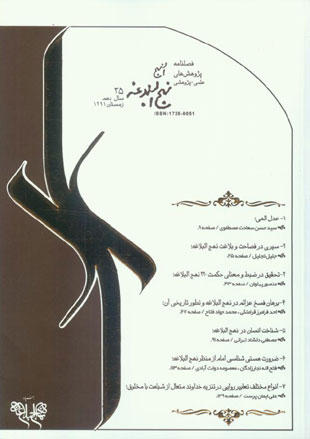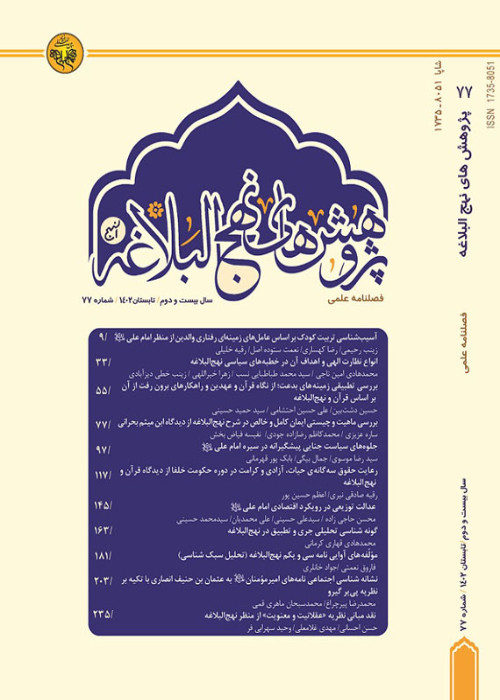فهرست مطالب

نشریه پژوهش های نهج البلاغه
سال یازدهم شماره 3 (پیاپی 35، پاییز 1391)
- تاریخ انتشار: 1391/10/11
- تعداد عناوین: 8
-
-
صفحه 5
-
صفحه 9
-
صفحه 91
-
Page 9There is a dispute among Shi‘a and Ash‘arites over divine justice. Shi‘a and Mu‘tazila accept divine justice – and that is why they are called‘Adliyya (those who believe in ‘adl, i.e., divine justice) as well – but Ash‘arites raise some question as to that. In the present essay, we discuss meanings of divine justice as well as Shiite and Sunni perspectives in this connection referring to the four-fold proofs of intellect, Quran, hadiths, and consensus.Keywords: Shia, Asharites, divine justice, Mutazila, Nahj al Balagha
-
Page 25Rays of miraculous eloquence of the holy Quran, a book which is the unique example and the majestic model of eloquence, is reflected in the holy prophet’s words and later on has manifested itself in Imam Ali’s Nahj al-Balagha. The present essay reports an itinerary of stream of eloquence in that great, celebrated book.Keywords: eloquence, brevity, prolixity, omission, emphasis, attribution, layers of similitude, symbol of metaphor, detaching, attaching, allusion
-
Page 43There are two variations of “mana‘a ghaniyun” and “mutti‘a bihi ghaniyun” in hikma 320 of Nahj al-Balagha – a hikma dealing with duties of the rich for the poor. Several old manuscripts, commentaries of great commentators of Nahj al-Balagha, and hadiths of holy Imams endorse the former. Among reasons why the latter is chosen is lack of awareness of some commentators that the verb “mana‘a” is intransitive, and prevalence of anti-capitalistic movements in recent centuries.Keywords: rich, poor, manaa, muttia, Nahj al Balagha
-
Page 67A survey of available documents whose subjects are related to religious doctrines indicates that the argument of “dissolution of resolution” has always been taken into consideration throughout Islamic era, but not studied nor discussed thoroughly by scholars so that one may consider it as an independent demonstration on the knowledge of God. That argument, which is narrated in the treasure of holy Imams’ hadiths from Imam Ali, is reported in 4 forms and has drawn attention of commentators of Nahj al-Balagha, theologians, and mystics. Generally speaking, survey of evolution of that Alawid doctrine on the knowledge of God indicates that such argument is not taken into consideration parallel to other arguments and ologians has treated it as a traditional proof without intending to develop and analyze it.
-
Page 91Knowledge of man in Imam Ali’s teachings in Nahj al-Balagha is a fundamental, structural knowledge, for all human affairs are dependent upon knowledge of man; and even kind of knowledge of man determines tendencies, values, methods, actions, and systems of human life. Knowledge of man’s reality is the most significant facet of such knowledge: man is an existent who is endowed with all talents and can be taught by all God’s most beautiful Names and highest Attributes. A series of internal and external factors are involved in the formation of man’s educational structure and dispositions. It is the result of such factors, the most significant of which being man’s will, that forms man’s spiritual personality. God has considered man so great that He has delivered determination of destiny of the latter to himself. This existent is not merely a this-worldly creature; rather, this world is a place where man can prepare grounds for going to the destination he is created for. In his way to evolution, man can go such far that he may become a perfect man; a man who has controlled his lusts and made his intellect thrive.Keywords: knowledge of man, reality of man, differences of men, man, destiny, man's fate, man's happiness, unblessedness, man's limitedness, perfect man
-
Page 141The Almighty’s having no likeness and similitude is a principle frequently mentioned in the Quran and hadiths. Nevertheless, among various schools of thought are some whose beliefs on God lead to a kind of likening Him to creatures. The present research gathers and classifies various expressions of “the Almighty’s transcending all attributes of creatures” mentioned in hadiths in order to prepare grounds for responding to most questions and doubts in this connection. It indicates that in hadiths’ language the Almighty transcends likening to creatures, His Essence refuses what exists in creatures, and the Creator is distinct, differentiated, and distinguished from creatures.Keywords: transcendence, similitude, the Creator being distinct from creatures, Nahj al Balagha


